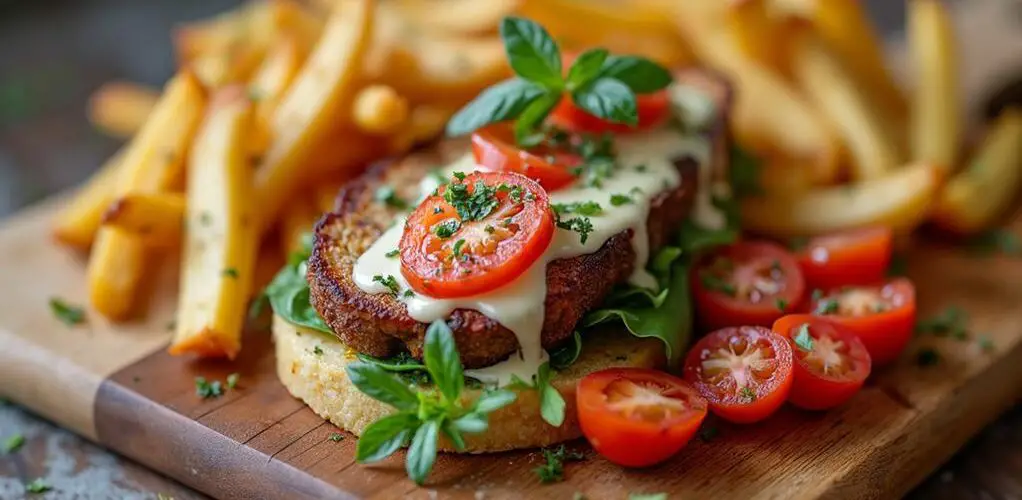
To maintain ketosis on a keto diet, avoid foods like refined carbohydrates (e.g., white bread, pasta, and rice), sugary beverages (e.g., soda and fruit juice), and high-carb fruits (e.g., bananas and grapes). Alcoholic drinks, particularly beer and sugary cocktails, can also disrupt your carb limits. Additionally, starchy vegetables such as potatoes and corn, as well as sweeteners like honey and maple syrup, should be excluded. Opting for keto-friendly alternatives will help you achieve and sustain ketosis more effectively. To understand the impact of these foods on your metabolic health, more detailed insights can be explored.
Key Takeaways
- Avoid refined carbohydrates like white bread, pasta, and rice due to their high carb content.
- Steer clear of high-carb alcoholic beverages such as beer, sweet wines, and sugary cocktails.
- Do not consume high-carb sweeteners like honey, maple syrup, and fruit juices.
- Limit starchy vegetables like potatoes, corn, and carrots to maintain ketosis.
- High-carb fruits such as bananas, grapes, and mangoes should be avoided.
Refined Carbohydrates
Refined carbohydrates are a key category of foods to avoid on a keto diet due to their high carbohydrate content, which can disrupt the state of ketosis. Foods like white bread, containing approximately 13 grams of carbs per slice, greatly contribute to increased carb intake.
Similarly, cooked white pasta is particularly high in carbohydrates, with around 33 grams of carbs per cup, making it unsuitable for maintaining ketosis. Moreover, a half-cup of cooked white rice contains about 26.5 grams of carbs, which can quickly exceed the daily carb limits set by a ketogenic diet.
Additionally, white flour tortillas present another challenge with about 36 grams of carbs per regular tortilla. These refined carbohydrates can easily hinder the metabolic state of ketosis, where the body primarily burns fat for fuel instead of carbohydrates.
To effectively avoid these pitfalls, individuals on a keto diet should consider keto alternatives. For instance, mashed cauliflower can serve as a low-carb substitute for rice, while low-carb breads made from eggs, nuts, or seeds can replace traditional bread and tortillas.
Alcoholic Beverages
When considering alcoholic beverages on a keto diet, it is essential to recognize that beer and mixed drinks are often high in carbohydrates, which can impede ketosis.
Low-carb beers typically have fewer than 5g of carbs per serving, making them a better choice. Additionally, low-carb options like spirits such as vodka, gin, and whiskey contain zero carbs but should be consumed in moderation to avoid metabolic disruptions.
Additionally, sweet wines contain added sugars that can increase carbohydrate intake, making them less suitable for a keto regimen.
High-Carb Alcohol Choices
Steering through the landscape of alcoholic beverages can be particularly challenging for those adhering to a ketogenic diet, primarily due to the high carbohydrate content found in many popular options.
For instance, beer is notoriously high in carbohydrates, often containing over 15 grams of carbs per serving, which makes it unsuitable for a keto diet. Finding suitable beer alternatives can be vital for those who enjoy a cold brew but wish to maintain ketosis.
Mixed drinks and cocktails pose another notable obstacle. These beverages typically include sugary mixers that greatly increase their carbohydrate content.
For example, cocktails like piña coladas can have upwards of 30 grams of carbs each, making them highly detrimental to maintaining ketosis. Instead of traditional cocktail recipes, those on a keto diet should consider low-carb versions to avoid disrupting their metabolic state.
Sweet wines also contribute to excessive carb intake due to their high levels of natural sugars. This can hinder weight loss efforts and push one out of ketosis.
As a result, it's essential to be mindful of alcohol choices to adhere to a ketogenic diet effectively. Opting for spirits with no or low carbs, such as vodka or whiskey, is generally recommended.
Low-Carb Drink Alternatives
Maneuvering the world of alcoholic beverages on a keto diet necessitates careful selection to maintain low carbohydrate intake. Beer should be avoided due to its high carb content, often exceeding 15 grams per serving, which can disrupt ketosis. Similarly, mixed drinks with sugary mixers are unsuitable and should be replaced with low carb mixers like soda water.
Opting for spirits such as vodka, gin, and whiskey is advisable, as these contain little to no carbs when consumed neat or with zero-calorie mixers. Sweet wines and dessert wines, which often have added sugars, are also unsuitable for a strict ketogenic regimen.
Moderation remains essential, as alcohol can impede fat metabolism and cause dehydration. Here is a comparison of various options:
| Beverage Type | Carb Content | Keto Friendly Alternatives |
|---|---|---|
| Beer | High (>15g) | N/A |
| Mixed Drinks | High (varies) | Spirits with soda water |
| Sweet Wines | High (varies) | Dry wines (minimal carbs) |
For keto friendly cocktails, focus on low carb mixers and spirits. Following these guidelines can help maintain ketosis while enjoying occasional alcoholic beverages.
Sugars and Sweeteners
Sugars and sweeteners like honey, maple syrup, and agave syrup contain high carbohydrate content that can greatly disrupt ketosis, with each tablespoon contributing around 13-17 grams of carbs.
These high-carb options can lead to blood sugar spikes, hindering the ketogenic process. Even seemingly innocent choices like fruit juices and artificial sweeteners often hide substantial carb counts, further complicating adherence to a keto diet.
It's important to be cautious of hidden sugars in products, as they can derail keto efforts.
Additionally, many of these sweeteners have a high glycemic index, which can quickly spike blood sugar levels.
High Carbohydrate Content
One of the most essential aspects of maintaining a successful ketogenic diet is vigilant attention to carbohydrate intake, particularly from sugars and sweeteners. Sugars and certain sweeteners are high in carbohydrates and can disrupt ketosis. For instance, honey contains approximately 17 grams of carbs per tablespoon, while maple syrup has around 13 grams per tablespoon. Agave syrup is similarly high, making these options unsuitable for those following a keto regimen.
| Sweetener | Carbohydrates per Tablespoon |
|---|---|
| Honey | 17g |
| Maple Syrup | 13g |
| Agave Syrup | High |
Fruit juices, often perceived as healthy, are also problematic due to their high carbohydrate content. A cup of orange juice contains over 20 grams of carbs and lacks fiber, which is counterproductive for those on a ketogenic diet. Common sweeteners like table sugar and corn syrup provide no nutritional value while easily exceeding daily carb limits, hindering weight loss efforts.
Effective carb counting is vital, and exploring sweetener alternatives like stevia or erythritol, which have minimal or zero carbs, can be beneficial. By making informed choices, individuals can better adhere to their ketogenic goals and maintain a state of ketosis.
Blood Sugar Spikes
Frequently, managing blood sugar levels is an essential component of a successful ketogenic diet, especially when it comes to sugars and sweeteners. Foods and beverages high in sugar content, such as honey (17g carbs per tablespoon) and maple syrup (13g carbs per tablespoon), can cause significant blood sugar spikes.
These spikes can disrupt ketosis, a metabolic state vital for the ketogenic diet. Consuming high-carb sweeteners like agave syrup similarly impacts blood sugar, leading to unstable insulin levels, which is particularly concerning for individuals with insulin resistance.
A cup of orange juice, containing over 20g of carbs, lacks the fiber necessary to mitigate its sugar impact, making it unsuitable for a keto diet aimed at improving metabolic health.
Sweetened beverages, such as Coca-Cola, with 39g of carbs per 12-ounce can, can easily exceed daily carb limits, hindering weight loss efforts and negatively affecting metabolic health.
Additionally, sweeteners often offer minimal nutritional value compared to their high carb content, making them detrimental to maintaining ketosis and overall health.
Avoiding these high-sugar foods and beverages is essential for sustaining ketosis and supporting long-term metabolic health.
Disrupts Ketosis Process
Managing blood sugar levels effectively is fundamental to maintaining ketosis, the metabolic state in which the body burns fat for fuel instead of carbohydrates. Sugars and sweeteners pose a significant risk to this process.
For instance, honey contains 17 grams of carbohydrates per tablespoon, and maple syrup holds 13 grams per tablespoon, both capable of causing substantial blood sugar spikes. These spikes disrupt ketosis by increasing insulin levels, which in turn hinders fat burning.
Fruit juices, often perceived as healthy, can contain over 20 grams of carbohydrates per cup and lack fiber, leading to heightened insulin levels. Such beverages are counterproductive to the low-carb goals of a keto diet.
Similarly, a 12-ounce can of Coca-Cola contains around 39 grams of sugar, far exceeding the daily carbohydrate limit required to maintain ketosis.
High-carb sweeteners like agave syrup should also be avoided for their comparable carb content to traditional sugars.
Even seemingly benign condiments such as ketchup, with approximately 3 grams of carbs per packet, can cumulatively affect ketosis stability.
Careful meal planning and choosing appropriate snack alternatives are essential strategies to maintain ketosis and avoid these high-carb pitfalls.
Fruit Juices
Fruit juices, despite their natural origins, pose a considerable challenge for individuals adhering to a ketogenic diet. These beverages are high in naturally occurring sugars and can contain over 20 grams of carbohydrates per cup, which greatly disrupts ketosis.
For instance, a single cup of orange juice can provide more than double the carb content recommended for a daily keto diet limit of 20-50 grams. This high carbohydrate content is problematic because it can quickly lead to exceeding daily carb allowances, thereby obstructing the state of ketosis.
Additionally, similar to traditional cereals and other high-carb breakfast foods, fruit juices can cause rapid spikes in blood sugar levels.
Furthermore, fruit juices lack the essential fiber found in whole fruits, contributing to rapid spikes in blood sugar levels. Even 100% fruit juices, often perceived as healthy, are detrimental to a ketogenic regimen. Instead, individuals should consider healthy alternatives and juice substitutes to maintain ketosis.
Key considerations include:
- High Carbohydrate Content: Over 20 grams of carbs per cup can disrupt ketosis.
- Blood Sugar Spikes: Lack of fiber leads to rapid increases in blood sugar levels.
- Exceeding Carb Limits: Even small amounts can surpass daily keto carb limits.
- Perception versus Reality: 100% fruit juice is still high in carbs.
- Whole Fruits: Opt for lower-carb fruits like berries for better keto compliance.
Sugary Beverages
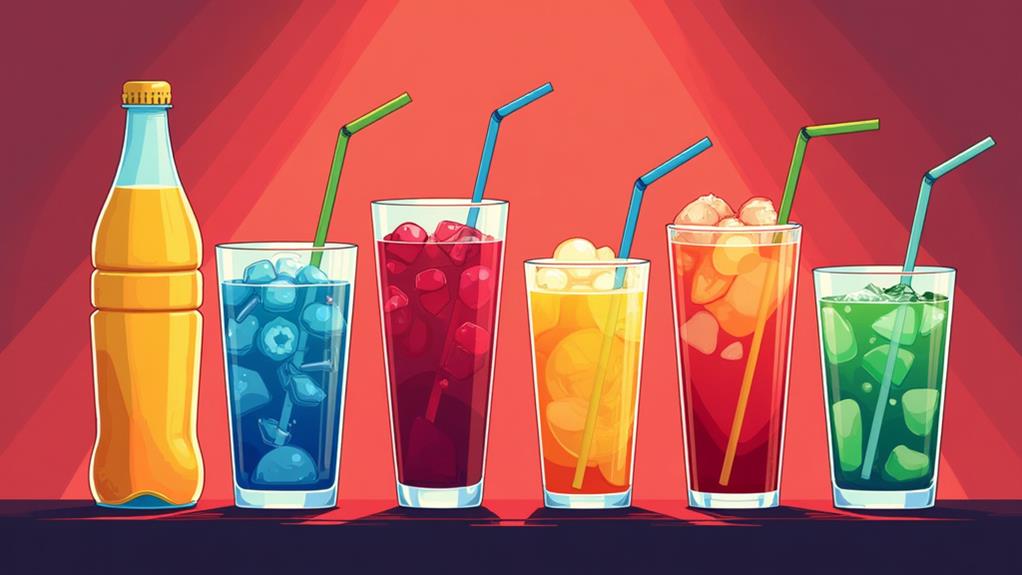
While fruit juices are notoriously high in carbohydrates, sugary beverages present an even greater challenge for those adhering to a ketogenic diet. For instance, a 12-ounce can of soda can contain over 39 grams of sugar, markedly surpassing the daily carbohydrate limit necessary to maintain ketosis.
Similarly, sweetened drinks like energy drinks and sweetened iced teas often harbor hidden sugars that can spike insulin levels, disrupting the delicate metabolic state vital for a keto diet. Additionally, these spikes can prevent the steady blood sugar levels essential for effective diabetes management on a keto diet.
Alcoholic beverages such as beer add another layer of complexity; many varieties exceed 15 grams of carbohydrates per serving, potentially hindering weight loss and ketosis. These high-carb drinks can derail progress by causing insulin spikes and increased cravings for other carbohydrate-rich foods.
To navigate these pitfalls, adopting effective hydration strategies is important. Opting for sugar alternatives and low-carb drinks like unsweetened iced tea, coffee, or sparkling water can help maintain hydration without compromising ketogenic goals.
These beverages provide a safer way to stay hydrated and satisfy cravings without exceeding carb limits. By making informed choices and avoiding sugary beverages, individuals on a keto diet can better manage their carbohydrate intake and sustain ketosis.
Starchy Vegetables
Starchy vegetables, which include common staples like potatoes, sweet potatoes, corn, peas, and carrots, pose a significant challenge for individuals following a ketogenic diet due to their high carbohydrate content.
For instance, a medium potato contains approximately 37 grams of carbs, while a medium sweet potato offers about 20 grams of net carbs. This can quickly surpass the daily carb limits typically set for maintaining ketosis. High-carb vegetables also lack the essential vitamins and antioxidants found in keto-friendly alternatives.
Similarly, a cup of corn provides around 27 grams of carbs, and peas contribute about 25 grams per cup, both of which can disrupt a low-carb regimen.
Although carrots are slightly lower in carbs, with around 12 grams per cup, they should still be consumed in moderation to avoid hindering the ketogenic process.
For those adhering to a ketogenic diet, considering starch alternatives and vegetable substitutes is essential:
- Cauliflower: Low in carbs and versatile for various recipes.
- Zucchini: Can be used as noodles or in stir-fries.
- Broccoli: Nutrient-dense and low in carbs.
- Bell peppers: Offer a sweet crunch with fewer carbs.
- Spinach: Ideal for salads and cooking, with minimal carbs.
High-Carb Fruits
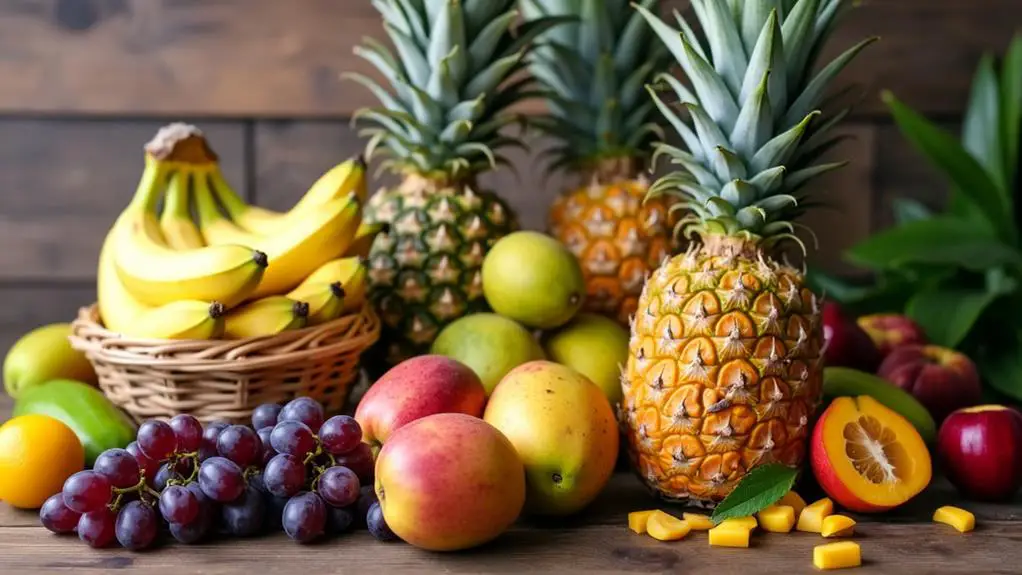
Many fruits, despite their nutritional benefits, contain high levels of carbohydrates that can hinder the success of a ketogenic diet. For instance, bananas, with approximately 27 grams of carbs per medium fruit, are a notable example of high-carb fruits that are unsuitable for maintaining ketosis.
Similarly, a cup of grapes has around 27 grams of carbs, which can considerably contribute to exceeding daily carb limits, potentially disrupting ketosis. According to research shows, the strict carbohydrate limit is essential for consistent ketosis, which outperforms conventional diets in the initial six months.
Mangoes, another high-carb fruit, contain about 25 grams of carbs per medium-sized fruit. Their high sugar content makes them a poor choice for those adhering to a keto diet.
Apples, offering approximately 25 grams of carbs each, also present a challenge, as consuming them in excess can easily disrupt ketosis. Even oranges, which are often considered a healthy snack, contain around 15 grams of carbs per medium fruit, necessitating careful portion control.
To stay within the carb limits of a ketogenic diet, individuals should consider low carb fruits such as berries, which provide fewer carbohydrates per serving.
Additionally, fruit alternatives like avocados and olives can provide essential nutrients without compromising ketosis. By making informed choices, one can enjoy fruits while adhering to a ketogenic lifestyle.
Frequently Asked Questions
What Foods Are Not Allowed on Keto?
To address keto misconceptions, high-carb fruits, starchy vegetables, grains, sugary beverages, and processed snacks should be avoided. Instead, focus on carb alternatives such as leafy greens, cauliflower, and healthy fats to maintain ketosis effectively.
What Foods Can You Eat Unlimited Amounts of on Keto?
On a keto diet, you can consume unlimited amounts of non-starchy vegetables, healthy fats, and low carb snacks such as spinach, broccoli, and cheese. These foods provide essential nutrients while maintaining low carbohydrate intake.
What Are the Top 10 Keto Foods?
The top 10 keto foods include fatty cuts of meat, non-starchy vegetables, avocados, high-fat dairy, and nuts. These staples support effective keto meal prep and offer versatile keto snack ideas, ensuring balanced nutrition and minimal carbs.
Can I Eat a Banana on Keto?
No, you should not eat a banana on keto due to its high carbohydrate content. Instead, consider banana alternatives like raspberries or strawberries, which are keto-friendly fruits with considerably lower carb content.
Conclusion
To conclude, adherence to a ketogenic diet necessitates the exclusion of refined carbohydrates, alcoholic beverages, sugars and sweeteners, fruit juices, sugary beverages, starchy vegetables, and high-carb fruits. These food items can greatly disrupt ketosis by increasing blood glucose levels and providing an excess of carbohydrates, thereby hindering the body's ability to utilize fats as the primary energy source. Ensuring the elimination of these foods is essential for achieving and maintaining the metabolic state conducive to the ketogenic diet's benefits.
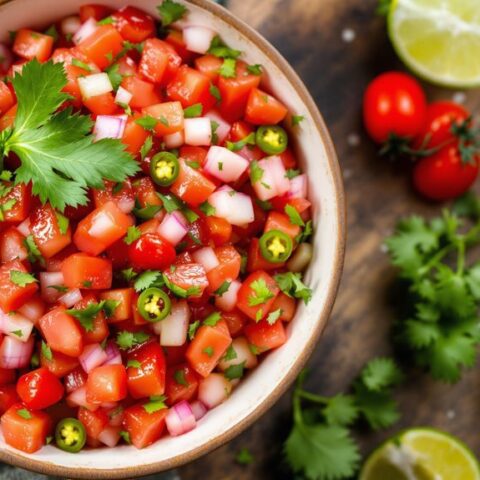

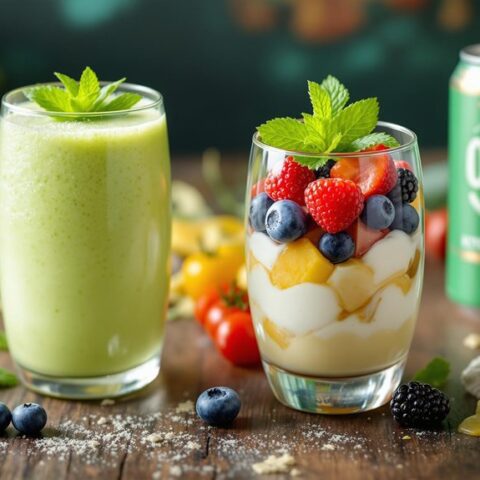
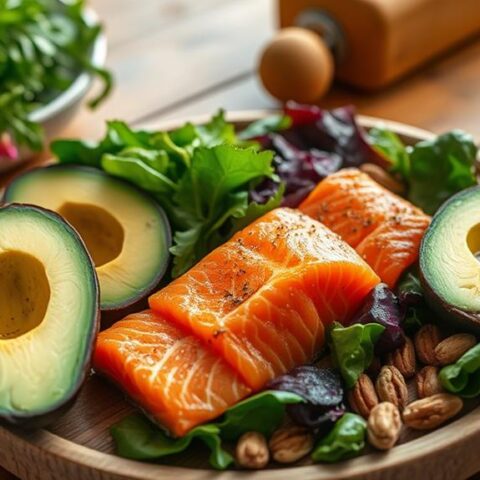
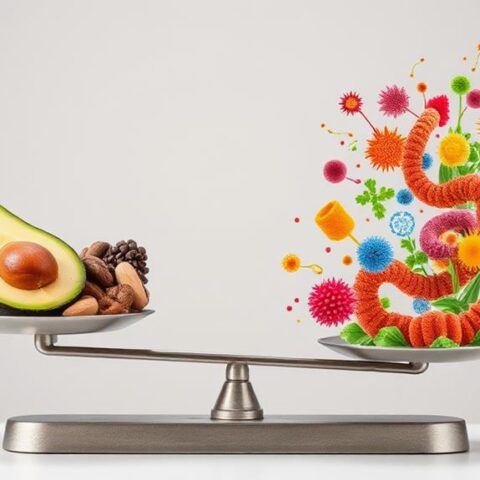
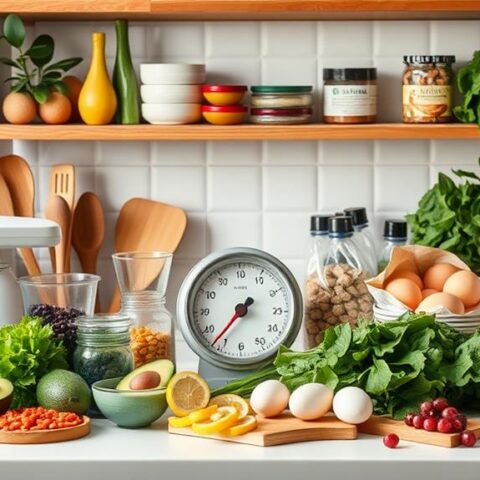




No Comments